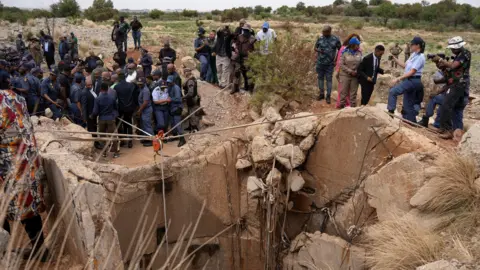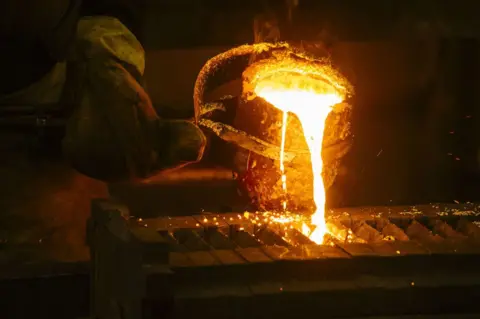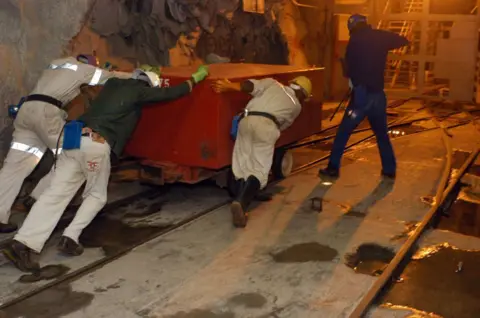South Africa’s illegal mining industry: Gang-controlled ‘cities’ grow underground

 Getty Images
Getty ImagesAlong with about 600 other men, Ndumiso lives and works in a small gang-controlled “village” – complete with markets and a red-light district – that has grown underground in a disused gold mine in South Africa.
Ndumiso told the BBC that after being fired by a large mining company, he decided to join this criminal group on his land to become a “zama zama”, an illegal miner.
He mines the precious metal and appears every three months to sell it on the black market for a huge profit, earning more than before – although the risks are now much higher.
“Underground life is merciless. Many don’t make it,” said the 52-year-old man, who spoke to the BBC on the condition that his real name not be used as he fears reprisals.
“On the other level of the pit there are corpses and bones. We call that the graves of zama-zama,” he said.
But for those who survive like Ndumiso, the work can be very profitable.
While he sleeps on sand poles after days of misery underground, his family lives in a house he bought in a township in the big city, Johannesburg.
He paid 130,000 rand (about $7,000; £5,600) for a one-bedroom house, which he has now extended to include three more bedrooms, he said.
Ndumiso, who has been an illegal miner for about eight years, has managed to send his three children to paying schools – one of which is a district university.
“I have to take care of my wife and children and this is the way I know,” he said, adding that he preferred to work underground than to join the ranks of crime by being a car thief or a bully, after spending a lot of time. years of trying to get a job in law.
His current job is mining in the small town of Stilfontein, 145 kilometers south-west of Johannesburg, which the center of global attention after the government minister, Khumbudzo Ntshavheni, promised to “blow up” hundreds of miners who were underground there, the security forces prevented food and water from being brought down.
Criminals do not help themselves, criminals must be prosecuted,” said Ntshavheni.
A campaign group, the Society for the Protection of Our Constitution, has filed a lawsuit seeking access to the minefield, which police say is 2km (1.2 miles) deep.
The court issued a temporary ruling, saying that food and other essentials can be brought to the miners.
 Reuters
ReutersNdumiso works in another pit in this mine, and he appeared last month, before the work was stopped.
He is currently waiting to see how the situation will go, before deciding whether he will return.
The disagreement follows the government’s decision to crack down on an industry that has lost power as it is run by criminals such as the mafia.
“For many years, the country has been dealing with this scourge of illegal mining, the mining communities have been burdened by criminal acts involving rape, robbery and destruction of public infrastructure,” said the Chairman of the Parliamentary committee Mr. Mikateko Mahlaule. in mineral resources.
The President of South Africa, Mr. Cyril Ramaphosa, said that the mine is a “crime area”, but the police are negotiating with the miners to end the disagreement, rather than going down to arrest them.
“Law enforcement authorities have information that some miners are armed with guns. It is known that illegal miners are recruited by gangs and are part of organized crime groups,” he added.
Ndumiso was among hundreds of thousands of workers – local and residents of neighboring regions such as Lesotho – laid off as South Africa’s mining industry declined over the past three decades. Many of these have become “zama zama” in defunct mines.
A researcher from the Benchmark Foundation based in South Africa, David van Wyk, who has researched this industry, said there are about 6,000 abandoned mines in the country.
“Although they are not profitable with large industrial mines, but they are profitable with small mines,” he told i BBC Focus on Africa podcast.
Ndumiso said he worked as a drill operator, earning less than $220 (£175) a month, in a gold mining company until he was laid off in 1996.
After struggling for the next 20 years to find a full-time job due to the high unemployment rate in South Africa, he said he decided to become an illegal miner.
There are tens of thousands of illegal miners in South Africa, Mr. Van Wyk says that there are only about 36 000 in Gauteng province – which is the center of the country’s economy, where gold was first discovered in the 19th century.
“Zama zamas often spend months underground without coming out and rely heavily on external support for food and other necessities. It is a difficult and dangerous job,” said a report by the campaign organization Global Initiative Against Transnational Organized Crime.
“Some carry guns, rifles and automatic weapons to protect themselves from rival mining gangs,” it added.
Ndumiso told the BBC that he had the gun, but he also paid his team a monthly “protection fee” of $8.
Its heavily armed guards are fleeing threats, especially from Lesotho’s notoriously deadly criminals, he said.
Under the protection of the gang for 24 hours, Ndumiso said he used dynamite to blow up rocks and unusual tools like a pick, spade and chisel to find gold.
Most of what he earns he gives to the gang leader, who pays him at least $1,100 every two weeks. He said he was able to keep the gold he sold on the black market to supplement his income.
He was among the lucky miners to have such a system, he said – explaining that some were kidnapped and taken to the pit to work as slaves, without receiving pay or gold.
 Getty Images
Getty ImagesNdumiso said he usually stays underground for about three months at a time, then comes up for two to four weeks to spend time with his family and sell his gold, before returning to the deep pit.
“I look forward to sleeping in my own bed and eating home-cooked meals. Breathing fresh air is an incredibly powerful feeling.”
Ndumiso doesn’t go out often anymore in case he loses his digging site, but after three months it becomes difficult to stay underground.
He remembered that one time when he reached the top: “I was so blinded by the sunlight that I thought I was blind.”
His skin was also so pale that his wife took him to a doctor for a check-up: “I was honest with the doctor about where I lived. He didn’t say anything, he just treated me. He gave me vitamins.”
Above, Ndumiso is not just chilling. He also works with other illegal miners as ore stones brought up from below are blasted and crushed into powder.
This is then “laundered” by his team in a temporary factory to separate the gold using dangerous chemicals such as mercury and sodium cyanide.
Ndumiso said he then sold his share of gold – one gram for $55, less official price about $77.
He said he has a ready buyer, whom he contacted via WhatsApp.
“The first time I met him, I didn’t trust him, so I told him to meet at the parking lot of the police station, I knew I would be safe there.
“Now we meet at any parking lot, we have a scale. We measure the gold right there. Then I give it to him, and he pays me in cash,” he said, indicating that he was walking inside. $3,800 and $5,500.
He receives this money every three months, which means his annual income is between $15,500 and $22,000 – much higher than the $2,700 he was earning as a legally employed miner.
Ndumiso said the leaders of gangs earn a lot but he does not know how much.
 Getty Images
Getty ImagesRegarding the buyer of his gold, Ndumiso said he did not know anything about him except that he was a white man in an illegal industry that included people of different races and classes.
This makes it difficult to stop the financing of crime, as Mr Van Wyk says the government is targeting the miners – but not “the kingpins who live in the forest areas of Johannesburg and Cape Town”.
Mr Ramaphosa said illegal mining costs “our economy billions of rands in lost revenue, taxes and duties,” and the government will continue to work with mining companies “to ensure that they commit to rehabilitate or close down mines.” “.
Mr Van Wyk told BBC Focus on Africa that the government will worsen South Africa’s economic situation if it sticks to zama zama.
“There should be a policy that their activities are not illegal, well organized and controlled,” he added.
When Ndumiso goes back to work, he takes boxes of canned food with him to avoid paying the cheap prices at the local “markets”.
Apart from food, basic items – such as cigarettes, flashlights, batteries – and digging tools are sold there, he said.
This indicates that the community – or small town – has developed underground over the years, with Ndumiso saying that there is even a red light district, with traffickers brought in by gangs.
Ndumiso said the mine he was working in had several levels, and tunnels connected to each other.
“They are like highways, with painted signs showing the way to different places and levels – like the level we use as a toilet, or the level we call zama-zama cemeteries,” he said.
“Some were killed by members of rival gangs; others died when stones fell and were crushed by large rocks. I lost a friend after his gold was taken and he was shot in the head.”
Although living underground is dangerous, but thousands like Ndumiso are willing to take it, as they say it is another way to live and die poor in a nation where the unemployment rate is over 30%.
You may also be interested in:
 Getty Images/BBC
Getty Images/BBCSource link





